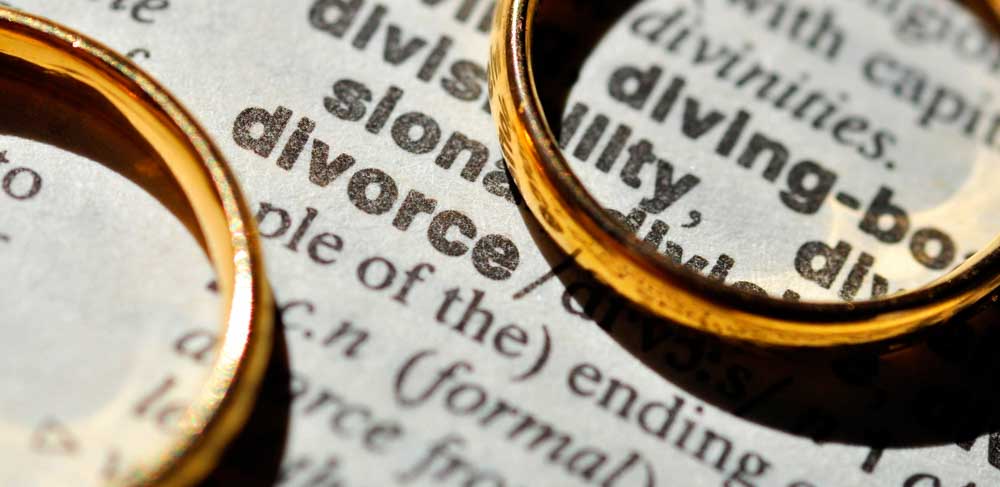Divorce and your credit score

Relationships don’t always work out as we want them to, and separating from a spouse can be a very emotional and long-winding process. This is particularly true when financial obligations are at the core of all problems and need to be reorganised.
Divorce and your credit score
Changing the legal status of your relationship does not affect your credit score directly. Whether you’re newlyweds, recently divorced or in a legal partnership, this doesn’t show up on your credit report and doesn’t affect your credit score.
However, it is likely that during your relationship you’ve had financial agreements in both of your names, for example, a mortgage, a loan or other forms of finance. Taking out shared finance with someone makes you ‘financial associates’. These shared agreements show up on your report and could potentially affect your credit score, as a potential lender may look at both your and your associate’s credit reports when you make new applications for credit.
Divorce and financial association
When you apply for a shared credit agreement with someone, they become your ‘financial associate’. Each applicant’s credit report then shows a link to each of those associates. It is important to know that a financial association isn’t bound to marriage or any other relationship status; it only refers to a shared credit agreement between people. The end of a relationship – divorce or otherwise – has no influence on the financial association, so the link can generally only be removed when the shared credit agreement is ended.
Financial dissociation
To unlink a financial associate from your credit report you need to:
- Close all shared accounts or convert them into individual accounts where necessary. In the case of divorce you need to sort out the division of assets beforehand. A divorce mediator can help with splitting up assets fairly and out of court. Alternatively, a solicitor can help when communication has broken down or the divorce is not amicable.
- Once all shared accounts are converted or closed, contact the credit reference agencies and request the financial link to be removed from your credit report. If the only shared agreement is a mortgage and you have not made any joint applications together, you may still be able to remove the financial association. Until the financial association is removed, financial actions from your associate could potentially impact your own credit report. When you’re looking for new credit the lender might take their credit report into consideration too.
Remember, your relationship status is not the deciding factor for a financial association - you can be in a healthy relationship and still want to disassociate from your partner for various reasons, for example, when the loan you once had is paid back in full.
Divorce and mortgage
When you have taken out a mortgage together but your relationship ends in divorce, there usually are several options for what happens to the property. Given that you can agree with your ex-spouse on how to proceed, Citizens Advice states that you could sell your home and split the equity, or that you could stay in your home and take over the mortgage payments if you can afford it. If you want to keep your home, they suggest that you speak to your mortgage lender directly, so they can check if you can afford the payments or if a new payment plan needs to be put in place. Once that is settled a solicitor can go ahead and transfer ownership of the property to your name.
Related Articles
- Hard vs Soft Credit Searches
- Can Renting Improve Your Credit Score?
- Guide to student overdrafts
- Guide to student credit
- What is a credit blacklist?
- What Is A Cash Advance?
- What are 0% interest credit cards?
- Moving to the UK and your credit score
- Who can see your credit report?
- Should you lease or buy your next car?
- Student loan repayments
- Balance transfers explained
- Credit cards and minimum repayments
- Financial association explained
- Getting a mobile phone contract with bad credit
- What is a credit union?
- Why have I been refused a credit card?
- Why do people use vehicle refinancing?
- What does my credit score say about me?
- What to do if you've missed payments
- New interest rates for savers and borrowers
- How to maintain a good credit score
- Can you achieve the highest credit score?
- Can you pay off loans early or late – or take a payment holiday?
- Infographic: Back to basics – how do credit reports and scores work?
- What happens to credit history when moving abroad
- Credit checks for renting
- Understanding credit score ranges
- How credit cards work – how they may affect your credit rating
- Students and credit reports
- Credit agreements – the basics
- Different types of credit card
- Death and credit reports
- Newlyweds, financial planning and credit
- Getting credit cards with bad credit history
- What is a guarantor and how do they work?
- Explaining compound interest
- How Credit Scores Affect Car Finance
- How can I improve my credit score?
- Getting credit with no credit history
- Soft credit searches explained
- What to consider when applying for credit cards
- What is a credit rating?
- What types of credit can you get?
- Staying on the electoral register when moving
- The Electoral Register and How It Influences Credit Scores
- 7 types of credit provider
- Electoral Roll Guide
- Credit: Why do People Use it?
- Credit Myths - The truth about Credit
- Interest Rate Types
- Credit Hygiene
- Which factors affect credit scores??
- Your Credit Limits: Do’s & Don’ts
- Secured Vs Unsecured Loans
- Joint Liability - Everything You Need to Know